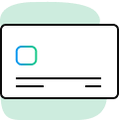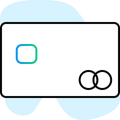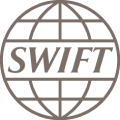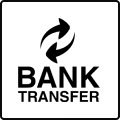Our charges and fees
Find out about our charges and fees so you know exactly how much you are paying when you trade with us.
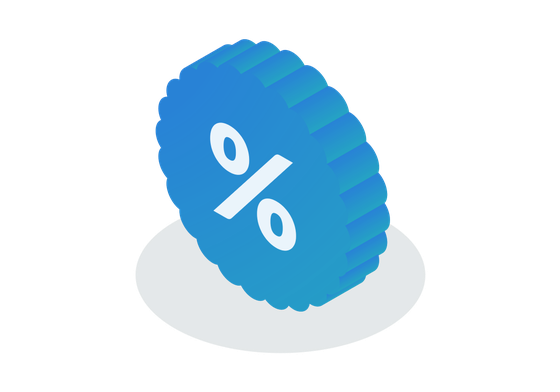
Deposit fees
We do not charge deposit fees. Please note however, that you may be charged by your payment provider or bank when depositing funds into your account.
Credit card
Your credit card provider may charge you a transaction fee and international processing fee. Please check with your credit card provider to determine the charges.
Debit card
It is possible that you may be charged a service fee by your bank when you are depositing funds by debit card to your OANDA account.
Internet banking via faster payments
Your bank may charge a service fee for depositing funds into your account. Intermediary banks may also deduct fees, resulting in a smaller incoming amount.
SWIFT wire
It is possible that you may be charged a service fee by your bank when you are depositing funds using this method.
SEPA credit transfer (SCT)
It is possible that you may be charged a service fee by your bank when you are depositing funds using this method.
For more information about depositing funds, visit our deposit funds FAQ page.
Withdrawal fees
Our withdrawal fees vary depending on the withdrawal method used.
Credit and debit cards
You can make one free withdrawal to your credit or debit card per calendar month. All subsequent withdrawals made in the same month will incur a fee. Withdrawal fees vary depending on your account currency.
Bank transfer
Withdrawals made by bank transfer will incur a fee. Fees vary dependent on your account currency and how many other bank transfer withdrawals you have made within the same calendar month.
For more information about withdrawal fees, visit our withdraw funds FAQ page.
Our financing fees
We apply a holding/duration charge or credit for positions kept open over time. View fees.
Inactivity fees
An inactivity fee is a monthly charge that is levied on your account if there has been no trading activity for a period of 12 months. Please note, inactivity fees will not be charged when there is an open position.
When inactivity fees are due, they are levied first on your sub-account with the smallest balance and continue to be debited from sub-accounts until a maximum of £10 per client has been debited each month. The amount claimed is converted to each sub-account’s home currency.
Inactivity fees will be applied to inactive accounts on the third last weekday of each month.
Levying of inactivity fees will not result in a negative balance on any of your accounts.
Your account will be charged until one of the following conditions are met:
- You close your account
- You resume trading on your account
- The balance on your account is reduced to zero.
If you have resumed trading after inactivity fees have been levied, you can request a rebate of up to 3 months’ worth of the inactivity fees based on how many months you have been charged. If you would like to deposit funds into your account and continue to trade, please refer to our 'How to fund your account' FAQ.
Currency conversion fees
When you trade an instrument in a currency that is different from your account currency, the realised profit or loss and any associated adjustments will be converted to the currency of your account at our prevailing currency exchange rate. This rate is calculated by applying a 0.5% mark-up or mark-down (depending on whether a debit or credit is to be applied to your account) to the midpoint price (buy + sell price divided in half) at the time of conversion.
For example, placing a EUR/USD trade in a GBP-based account. Your trade settles in USD and is then immediately converted to GBP at the USD/GBP mid-price +/-0.5%.
If this trade resulted in USD100 of profit, the cost of converting it back to GBP would be approximately GBP0.39 based on current market rates at the time of calculating.
See an example of how currency conversion is calculated in our FAQs section below.
Frequently asked questions
How can I fund my OANDA trading account?
To initiate your first deposit into your OANDA trading account, simply select the ‘manage funds’ tab after logging in to your account. This takes you to the My Funds page, where you can make deposits, withdrawals and transfers between your accounts.
How can I withdraw my funds from my OANDA account?
You can withdraw funds from your account via various means, for example: debit card, credit card and bank wire transfer.
Select the ‘manage funds’ tab after logging into your account, this takes you to the My Funds page.
Please note that withdrawals are subject to our hierarchy rules. If you have deposited funds using multiple methods, you must withdraw the total sum deposited by each means in a set order, for example: first by debit cards, then credit cards and finally bank wire transfer. Find out more about how you can withdraw funds from your account.
What are holding charges?
We apply a holding/duration charge or credit for positions kept open over time. These are calculated in relation to positions maintained on a continuous basis rather than a daily basis. View fees.
What are currency conversion fees?
Trading products in a different currency from your account's home currency will incur a currency conversion charge. OANDA charges a 0.5 % mark-up on the midpoint price at the time of conversion. This is the mark-up/mark-down portion applied to currency conversion rate.
When will I be charged a currency conversion fee?
Home currency conversion charges are applicable only when a trade/transaction is conducted in a different currency to the account’s home currency, and therefore needs to be converted to that home currency. It is applied to any realised profits and losses, adjustments, fees and charges that are denominated in a currency other than the account’s home currency and as such, needs to be converted to the account’s home currency.
How is currency conversion calculated?
Let’s say you have an account denominated in GBP. You open a long position on 1 unit of US Wall St 30 @ 29,000 and close your trade @ 29,100, generating a profit of USD100.
The cost of converting USD100 profit back to your home currency (GBP) would be GBP0.39, based on current market rates at the time of calculating.
How this is calculated:
In order to convert USD100 of profit to your account home currency (GBP), you would use the USD/GBP exchange rate plus the currency conversion fee.
Let’s assume the USD/GBP exchange rate is:
(Bid) 0.77000
(Ask) 0.77005
In this case, the profit is a credit to the account, so the bid price is used (if it had been a debit as a result of a loss, the ask price would have been used):
Profit converted to GBP without the mark-up = 0.7700 X 100 = GBP77.00.
We charge a mark up on the mid-price for the currency conversion to your account’s home currency:
Formula:
New bid = midpoint price x (1 - x%)
New ask = midpoint price x (1 + x%)
Where x% = mark-up (0.50%)
Midpoint price = (ask + bid)/2
Midpoint price = (0.77000 + 0.77005)/2 = 0.770025
Calculation:
Fee adjusted exchange rate to convert USD to GBP = 0.770025 x (1 - 0.5%) = 0.766174875.
The USD100 profit on the trade will result in a credit to your account when it is denominated in GBP of: 0.766174875 X 100 = GBP76.61.
This is GBP0.39 less than using the straight exchange rate and represents the cost of trading in USD when the account is denominated in GBP for this example.
Can't find what you're looking for?
Ready to start trading? Open an account in minutes
Already have a live trading account? It's easy to fund your account using one of the following payment methods.





What are financing costs?
Financing costs can affect your cost of trading, so it's important to understand how financing works.
Apply for an OANDA trading account
Open a live or practice trading account in three easy steps: apply, verify your identity and fund.
Depositing and withdrawing funds
It is simple and straightforward to deposit and withdraw funds to and from your OANDA account.
